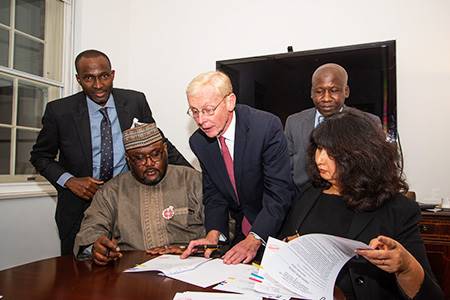Leather project will boost jobs and exports

A start-up venture that aims to build a world-class leather and finished product operation in Nigeria launched in early 2019. The initiative, called the Pan African Leather project, will involve setting up a new tannery, a new shoe factory and other artisan workshops for finished products in Sokoto in the north-west of the country, creating employment, reducing poverty, empowering women and young people and reclaiming the region’s leather past.
The leather industry in Africa, or in Nigeria, to be more precise, won backing for a new initiative at the start of this year, with supporters of the idea, the Pan African Leather project, insisting from the outset that it will generate employment opportunities and bring much needed export revenue growth to the city and state of Sokoto.
A publicly-owned investment facilitator in the state, the Sokoto Investment Company Limited (SICL), has contributed an initial round of seed funding for Pan African Leather. SICL’s chairman, Tukur Umar, and managing director, Muhammadu Dasuki, hosted a press event in London to launch the project. SICL has said its aim is to revitalise the region’s traditional leather sector. For Tukur Umar, nothing is more important in Nigeria than creating jobs and addressing youth unemployment. He says: “Our commitment to enhancing livelihoods and creating sustainable, skilled employment is crystal clear from the state’s financial input to this endeavour.”
Next steps will be to establish the new tannery and the footwear factory; SICL has told World Footwear that both these elements are at “the final approval stage” and will be called Sokoto Tan and Sokoto Shoes respectively. Suitable land for the factories has been secured, the new companies have been incorporated, the names have been registered and the recruitment exercise is under way to appoint the management teams to run them.
A team of experts
The project is being coordinated by London-based Pan African Enterprises (PAE), a social partnership platform that seeks to contribute to economic development, industry and innovation in Nigeria. Dawn Spetale, chief executive of PAE, has assembled an international team of experts, including diplomats, investment advisers and business figures, to help direct the project towards its goal of creating an integrated leather cluster in Sokoto that can compete internationally in terms of quality, cost and environmental protection. “Sokoto is taking the lead in building this cluster for the future of its economy, and PAE is providing support by plugging Sokoto into global networks of financial support, knowledge and marketing,” Ms Spetale says.
Those behind the new initiative have been pushing against an open door with the authorities in Sokoto. Leaders there began working on plans to revitalise the region’s leather industry in 2016 and received support from the United Nations Industrial Development Organization (UNIDO). A team from UNIDO conducted a seven-day assessment of the region and Aminu Waziri Tambuwal, the governor of Sokoto, said at the time that his administration was committed to establishing “solid structures” to develop the industrial capacities of the state, in sectors including leather.
Tukur Umar says the Pan African Leather project is the culmination of work that commenced following the UNIDO visit. “We would very much like to build on the work that UNIDO carried out, both in 2016 and then subsequently in Sokoto,” he explains.
Long leather history
The figures leading SICL have said leather is an obvious sector for the region to look to for economic development. Sokoto and its environs have been a traditional source of good quality leather for centuries, they say, pointing out that much of the raw material for traditional ‘Moroccan leather’ came across the Sahara from cities that have a long history of trade with North Africa, such as Sokoto. The position of Sokoto as a trade corridor between Nigeria, Niger and other countries has facilitated the free flow of hides and skins in the territory.
It still produces large volumes of sheep and goatskins as well as bovine hides and a first modern tannery opened in Sokoto in the early 1980s, although that venture only lasted a decade. A lack of access at that time to sufficient energy and water was one of the main reasons for the closure, as was an interest rate of more than 25% on finance, which affected the operator’s ability to invest in the business. Maintaining machinery and securing delivery of leather chemicals were also difficult then in this remote part of the country and, Buhari Dasuki recalls, much of Sokoto’s raw material ended up in the hands of tanners in Kano state, almost 500 kilometres away, where leather manufacturing was more established. “Our challenge will be to revive the industry in Sokoto and reverse the flow of raw material leaving the state,” he says.
Sustainable development
Nigeria’s federal government has long recognised that the country needs economic diversification “beyond and after oil”. The minister for science and technology, Ogbonnaya Onu, said last year that Nigeria is the second-biggest exporter of leather in Africa (after Ethiopia) and eighteenth in the world, but that there is still great potential to expand the industry and to end the practice of exporting raw or semi-finished material to other countries. Dr Onu emphasised the importance of this in fighting poverty and in creating jobs and wealth.
New policies are now in place to improve infrastructure, quality, standards, skills and innovation. Specific to the immediate needs of Sokoto Tan and Sokoto Shoe, SICL is content with the infrastructure that is available already in the city. It offers good access to the national road network and offers expansion capacity because suitable land is available if production needs to increase and extra water can come from bore holes in the area. In terms of energy, SICL is keen to use solar power at the facilities and is also exploring the viability of using solid waste from production in a waste-to-energy initiative for providing heat and hot water. The factories’ location will also be accessible for workers. The initial project will employ up to 1,000 people; recruiting women and young people will be priorities, offering them and all employees extensive and well planned training.
SICL’s leaders have pointed out that this commitment to empowering women and young people will help Sokoto and Nigeria in the quest to meet the Sustainable Development Goals (SDGs), the 17 priorities the United Nations identified in 2015 for sustainable development between now and 2030. Several other SDGs are part of the focus, too, not least fighting poverty. According to the World Bank, more than 30% of people in Sokoto live in extreme poverty. Sokoto Tan and Sokoto Shoe will help reduce poverty all the way along the leather value chain, from the pastoralists that raise the livestock to the people that sell the finished shoes and other products.
Demand for these products should be strong. It is “unbelievable”, SICL insists, that with Nigeria’s population in excess of 180 million people, it is currently only producing 1.6 million pairs of shoes each year. “We intend to increase that number and change the way that ‘Made in Sokoto’ is viewed,” it stated.
The Pan African Leather project launched in London in early 2019; standing (left to right): Bashir Gidado, Sokoto state commissioner for commerce, industry and tourism, Sir Richard Gozney, strategic adviser to PAE and former UK high commissioner to Nigeria, Tukur Umar, chairman of SICL. Seated (left to right): Muhammadu Buhari Dasuki, managing director of SICL, and Dawn Spetale, chief executive officer of PAE.Credit: Pan African Leather project








